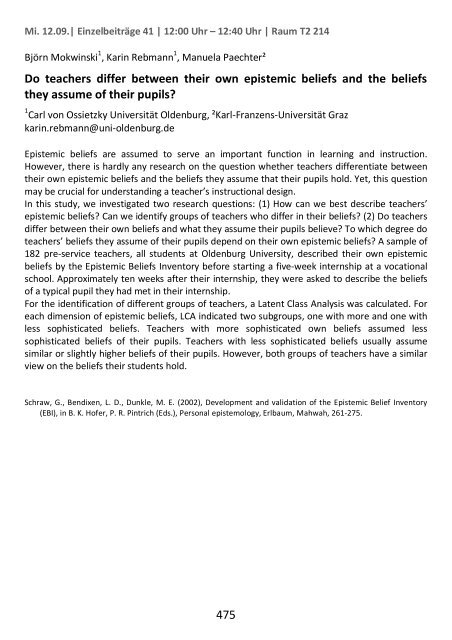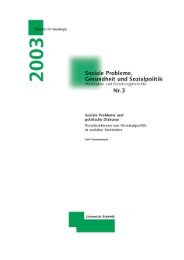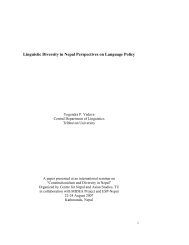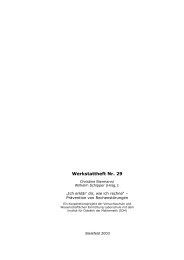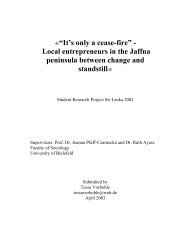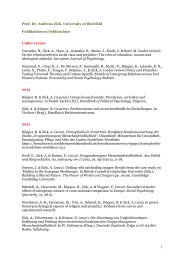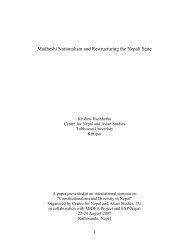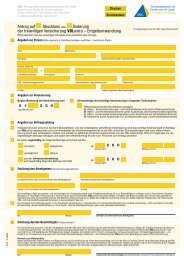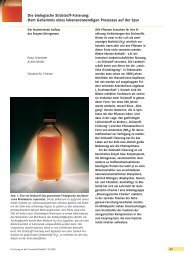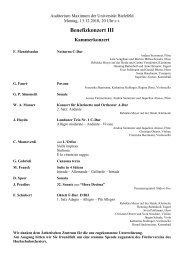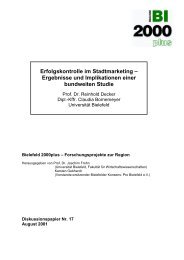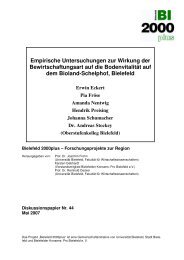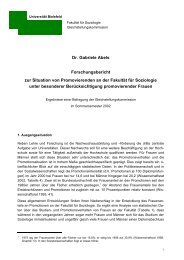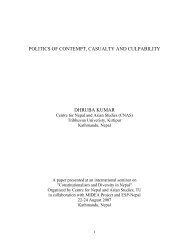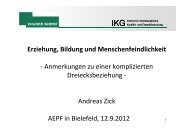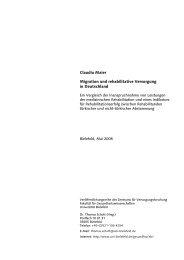- Seite 1 und 2:
77. Tagung der AEPF in Bielefeld Ar
- Seite 3 und 4:
Inhaltsverzeichnis Grußworte 4 Anr
- Seite 5 und 6:
Grußworte Liebe Kolleginnen und Ko
- Seite 8 und 9:
Anreise und Tagungsort Die Universi
- Seite 10 und 11:
So. 09.09. | Pre-Conference Worksho
- Seite 12 und 13:
Tagungsprogramm Sonntag 09. Septemb
- Seite 32 und 33:
Mo. 10.09.| Symposium 1 | 13:30 Uhr
- Seite 34 und 35:
Mo. 10.09.| Symposium 1 | 13:30 Uhr
- Seite 36 und 37:
Mo. 10.09.| Symposium 1 | 15:00 Uhr
- Seite 38 und 39:
Mo. 10.09.| Symposium 1 | 17:00 Uhr
- Seite 40 und 41:
Mo. 10.09.| Symposium 2 | 13:30 Uhr
- Seite 42 und 43:
Mo. 10.09.| Symposium 2 | 13:30 Uhr
- Seite 44 und 45:
Mo. 10.09.| Symposium 2 | 15:00 Uhr
- Seite 46 und 47:
Mo. 10.09.| Symposium 2 | 17:00 Uhr
- Seite 48 und 49:
Mo. 10.09.| Symposium 3 | 13:30 Uhr
- Seite 50 und 51:
Mo. 10.09.| Symposium 3 | 13:30 Uhr
- Seite 52 und 53:
Mo. 10.09.| Symposium 3 | 15:00 Uhr
- Seite 54 und 55:
Mo. 10.09.| Symposium 3 | 17:00 Uhr
- Seite 56 und 57:
Mo. 10.09.| Symposium 4 | 13:30 Uhr
- Seite 58 und 59:
Mo. 10.09.| Symposium 4 | 13:30 Uhr
- Seite 60 und 61:
Mo. 10.09.| Symposium 4 | 15:00 Uhr
- Seite 62 und 63:
Mo. 10.09.| Symposium 4 | 17:00 Uhr
- Seite 64 und 65:
Beiträge 1. Victoria Neuber, Josef
- Seite 66 und 67:
Mo. 10.09.| Symposium 5 | 14:15 Uhr
- Seite 68 und 69:
Mo. 10.09.| Symposium 5 | 16:15 Uhr
- Seite 70 und 71:
Mo. 10.09.| Symposium 6 | 13:30 Uhr
- Seite 72 und 73:
Mo. 10.09.| Symposium 6 | 13:30 Uhr
- Seite 74 und 75:
Mo. 10.09.| Symposium 6 | 15:00 Uhr
- Seite 76 und 77:
Mo. 10.09.| Symposium 6 | 17:00 Uhr
- Seite 78 und 79:
Beiträge 1. Inga Glogger, Rolf Sch
- Seite 80 und 81:
Mo. 10.09.| Symposium 7 | 14:15 Uhr
- Seite 82 und 83:
Mo. 10.09.| Symposium 7 | 16:15 Uhr
- Seite 84 und 85:
Mo. 10.09.| Symposium 7 | 17:45 Uhr
- Seite 86 und 87:
Beiträge 1. Verena Eberhard Zur Be
- Seite 88 und 89:
Mo. 10.09.| Symposium 8 | 14:15 Uhr
- Seite 90 und 91:
Mo. 10.09.| Symposium 8 | 16:15 Uhr
- Seite 92 und 93:
Mo. 10.09.| Symposium 9 | 13:30 Uhr
- Seite 94 und 95:
Mo. 10.09.| Symposium 9 | 13:30 Uhr
- Seite 96 und 97:
Mo. 10.09.| Symposium 9 | 15:00 Uhr
- Seite 98 und 99:
Mo. 10.09.| Symposium 9 | 17:00 Uhr
- Seite 100 und 101:
Mo. 10.09.| Symposium 10 | 13:30 Uh
- Seite 102 und 103:
Mo. 10.09.| Symposium 10 | 13:30 Uh
- Seite 104 und 105:
Mo. 10.09.| Symposium 10 | 15:00 Uh
- Seite 106 und 107:
Mo. 10.09.| Einzelbeiträge 1 | 13:
- Seite 108 und 109:
Mo. 10.09.| Einzelbeiträge 1 | 15:
- Seite 110 und 111:
Mo. 10.09.| Einzelbeiträge 1 | 17:
- Seite 112 und 113:
Mo. 10.09.| Einzelbeiträge 2 | 14:
- Seite 114 und 115:
Mo. 10.09.| Einzelbeiträge 2 | 16:
- Seite 116 und 117:
Mo. 10.09.| Einzelbeiträge 2 | 17:
- Seite 118 und 119:
Mo. 10.09.| Einzelbeiträge 3 | 14:
- Seite 120 und 121:
Mo. 10.09.| Einzelbeiträge 3 | 16:
- Seite 122 und 123:
Mo. 10.09.| Einzelbeiträge 4 | 13:
- Seite 124 und 125:
Mo. 10.09.| Einzelbeiträge 4 | 15:
- Seite 126 und 127:
Mo. 10.09.| Einzelbeiträge 4 | 17:
- Seite 128 und 129:
Mo. 10.09.| Einzelbeiträge 5 | 13:
- Seite 130 und 131:
Mo. 10.09.| Einzelbeiträge 5 | 15:
- Seite 132 und 133:
Mo. 10.09.| Einzelbeiträge 5 | 17:
- Seite 134 und 135:
Mo. 10.09.| Einzelbeiträge 6 | 13:
- Seite 136 und 137:
Mo. 10.09.| Einzelbeiträge 6 | 15:
- Seite 138 und 139:
Mo. 10.09.| Einzelbeiträge 6 | 17:
- Seite 140 und 141:
Mo. 10.09.| Einzelbeiträge 7 | 13:
- Seite 142 und 143:
Mo. 10.09.| Einzelbeiträge 7 | 15:
- Seite 144 und 145:
Mo. 10.09.| Einzelbeiträge 7 | 17:
- Seite 146 und 147:
Mo. 10.09.| Einzelbeiträge 8 | 13:
- Seite 148 und 149:
Mo. 10.09.| Einzelbeiträge 8 | 15:
- Seite 150 und 151:
Mo. 10.09.| Einzelbeiträge 8 | 17:
- Seite 152 und 153:
Mo. 10.09.| Einzelbeiträge 9 | 13:
- Seite 154 und 155:
Mo. 10.09.| Einzelbeiträge 9 | 15:
- Seite 156 und 157:
Mo. 10.09.| Einzelbeiträge 9 | 17:
- Seite 158 und 159:
Mo. 10.09.| Einzelbeiträge 10 | 13
- Seite 160 und 161:
Mo. 10.09.| Einzelbeiträge 10 | 15
- Seite 162 und 163:
Mo. 10.09.| Einzelbeiträge 10 | 17
- Seite 164 und 165:
Mo. 10.09.| Einzelbeiträge 11 | 17
- Seite 166 und 167:
Mo. 10.09.| Einzelbeiträge 12 | 13
- Seite 168 und 169:
Mo. 10.09.| Einzelbeiträge 12 | 15
- Seite 170 und 171:
Mo. 10.09.| Einzelbeiträge 12 | 17
- Seite 172 und 173:
Mo. 10.09.| Einzelbeiträge 13 | 14
- Seite 174 und 175:
Mo. 10.09.| Einzelbeiträge 13 | 16
- Seite 176 und 177:
Mo. 10.09.| Einzelbeiträge 13 | 17
- Seite 178 und 179:
Mo. 10.09.| Einzelbeiträge 14 | 14
- Seite 180 und 181:
Mo. 10.09.| Einzelbeiträge 14 | 16
- Seite 182 und 183:
Mo. 10.09.| Einzelbeiträge 15 | 13
- Seite 184 und 185:
Mo. 10.09.| Einzelbeiträge 15 | 15
- Seite 186 und 187:
Mo. 10.09.| Einzelbeiträge 15 | 17
- Seite 188 und 189:
Di. 11.09.| Postersession | Poster
- Seite 190 und 191:
Di. 11.09.| Postersession | Poster
- Seite 192 und 193:
Di. 11.09.| Postersession | Poster
- Seite 194 und 195:
Di. 11.09.| Postersession | Poster
- Seite 196 und 197:
Di. 11.09.| Postersession | Poster
- Seite 198 und 199:
Di. 11.09.| Postersession | Poster
- Seite 200 und 201:
Di. 11.09.| Postersession | Poster
- Seite 202 und 203:
Di. 11.09.| Postersession | Poster
- Seite 204 und 205:
Di. 11.09.| Postersession | Poster
- Seite 206 und 207:
Di. 11.09.| Postersession | Poster
- Seite 208 und 209:
Di. 11.09.| Postersession | Poster
- Seite 210 und 211:
Di. 11.09.| Postersession | Poster
- Seite 212 und 213:
Di. 11.09.| Postersession | Poster
- Seite 214 und 215:
Di. 11.09.| Postersession | Poster
- Seite 216 und 217:
Di. 11.09.| Postersession | Poster
- Seite 218 und 219:
Di. 11.09.| Postersession | Poster
- Seite 220 und 221:
Di. 11.09.| Postersession | Poster
- Seite 222 und 223:
Di. 11.09.| Postersession | Poster
- Seite 224 und 225:
Di. 11.09.| Postersession | Poster
- Seite 226 und 227:
Di. 11.09.| Postersession | Poster
- Seite 228 und 229:
Di. 11.09.| Postersession | Poster
- Seite 230 und 231:
Di. 11.09.| Postersession | Poster
- Seite 232 und 233:
Di. 11.09.| Postersession | Poster
- Seite 234 und 235:
Di. 11.09.| Postersession | Poster
- Seite 236 und 237:
Di. 11.09.| Postersession | Poster
- Seite 238 und 239:
Di. 11.09.| Postersession | Poster
- Seite 240 und 241:
Di. 11.09.| Postersession | Poster
- Seite 242 und 243:
Di. 11.09.| Postersession | Poster
- Seite 244 und 245:
Di. 11.09.| Postersession | Poster
- Seite 246 und 247:
Di. 11.09.| Postersession | Poster
- Seite 248 und 249:
Di. 11.09.| Postersession | Poster
- Seite 250 und 251:
Di. 11.09.| Postersession | Poster
- Seite 252 und 253:
Di. 11.09.| Postersession | Poster
- Seite 254 und 255:
Di. 11.09.| Postersession | Poster
- Seite 256 und 257:
Di. 11.09.| Postersession | Poster
- Seite 258 und 259:
Di. 11.09.| Postersession | Poster
- Seite 260 und 261:
Di. 11.09.| Postersession | Poster
- Seite 262 und 263:
Di. 11.09.| Postersession | Poster
- Seite 264 und 265:
Di. 11.09.| Symposium 11 | 13:15 Uh
- Seite 266 und 267:
Di. 11.09.| Symposium 11 | 13:15 Uh
- Seite 268 und 269:
Di. 11.09.| Symposium 11 | 14:45 Uh
- Seite 270 und 271:
Di. 11.09.| Symposium 12 | 13:15 Uh
- Seite 272 und 273:
Di. 11.09.| Symposium 12 | 13:15 Uh
- Seite 274 und 275:
Di. 11.09.| Symposium 12 | 14:45 Uh
- Seite 276 und 277:
Di. 11.09.| Symposium 12 | 16:45 Uh
- Seite 278 und 279:
Beiträge 1. Gabriele Hörl Herkunf
- Seite 280 und 281:
Di. 11.09.| Symposium 13 | 14:00 Uh
- Seite 282 und 283:
Di. 11.09.| Symposium 13 | 16:00 Uh
- Seite 284 und 285:
Beiträge 1. Ariane S. Willems, Kar
- Seite 286 und 287:
Di. 11.09.| Symposium 14 | 14:00 Uh
- Seite 288 und 289:
Di. 11.09.| Symposium 14 | 16:00 Uh
- Seite 290 und 291:
Di. 11.09.| Symposium 15 | 13:15 Uh
- Seite 292 und 293:
Di. 11.09.| Symposium 15 | 13:15 Uh
- Seite 294 und 295:
Di. 11.09.| Symposium 15 | 14:45 Uh
- Seite 296 und 297:
Di. 11.09.| Symposium 16 | 13:15 Uh
- Seite 298 und 299:
Di. 11.09.| Symposium 16 | 13:15 Uh
- Seite 300 und 301:
Di. 11.09.| Symposium 16 | 14:45 Uh
- Seite 302 und 303:
Di. 11.09.| Symposium 16 | 16:45 Uh
- Seite 304 und 305:
Beiträge 1. Andreas Bach, Kris-Ste
- Seite 306 und 307:
Di. 11.09.| Symposium 17 | 14:00 Uh
- Seite 308 und 309:
Di. 11.09.| Symposium 17 | 16:00 Uh
- Seite 310 und 311:
Di. 11.09.| Einzelbeiträge 16 | 13
- Seite 312 und 313:
Di. 11.09.| Einzelbeiträge 16 | 14
- Seite 314 und 315:
Di. 11.09.| Einzelbeiträge 16 | 16
- Seite 316 und 317:
Di. 11.09.| Einzelbeiträge 17 | 14
- Seite 318 und 319:
Di. 11.09.| Einzelbeiträge 17 | 16
- Seite 320 und 321:
Di. 11.09.| Einzelbeiträge 18 | 13
- Seite 322 und 323:
Di. 11.09.| Einzelbeiträge 18 | 14
- Seite 324 und 325:
Di. 11.09.| Einzelbeiträge 18 | 16
- Seite 326 und 327:
Di. 11.09.| Einzelbeiträge 19 | 14
- Seite 328 und 329:
Di. 11.09.| Einzelbeiträge 19 | 16
- Seite 330 und 331:
Di. 11.09.| Einzelbeiträge 20 | 14
- Seite 332 und 333:
Di. 11.09.| Einzelbeiträge 20 | 16
- Seite 334 und 335:
Di. 11.09.| Einzelbeiträge 21 | 14
- Seite 336 und 337:
Di. 11.09.| Einzelbeiträge 21 | 16
- Seite 338 und 339:
Di. 11.09.| Einzelbeiträge 22 | 13
- Seite 340 und 341:
Di. 11.09.| Einzelbeiträge 22 | 14
- Seite 342 und 343:
Di. 11.09.| Einzelbeiträge 22 | 16
- Seite 344 und 345:
Di. 11.09.| Einzelbeiträge 23 | 14
- Seite 346 und 347:
Di. 11.09.| Einzelbeiträge 23 | 16
- Seite 348 und 349:
Di. 11.09.| Einzelbeiträge 24 | 13
- Seite 350 und 351:
Di. 11.09.| Einzelbeiträge 24 | 14
- Seite 352 und 353:
Di. 11.09.| Einzelbeiträge 24 | 16
- Seite 354 und 355:
Di. 11.09.| Einzelbeiträge 25 | 14
- Seite 356 und 357:
Di. 11.09.| Einzelbeiträge 25 | 16
- Seite 358 und 359:
Di. 11.09.| Einzelbeiträge 26 | 13
- Seite 360 und 361:
Di. 11.09.| Einzelbeiträge 26 | 14
- Seite 362 und 363:
Di. 11.09.| Einzelbeiträge 26 | 16
- Seite 364 und 365:
Di. 11.09.| Einzelbeiträge 27 | 14
- Seite 366 und 367:
Di. 11.09.| Einzelbeiträge 27 | 16
- Seite 368 und 369:
Di. 11.09.| Einzelbeiträge 28 | 13
- Seite 370 und 371:
Di. 11.09.| Einzelbeiträge 28 | 14
- Seite 372 und 373:
Di. 11.09.| Einzelbeiträge 29 | 13
- Seite 374 und 375:
Di. 11.09.| Einzelbeiträge 29 | 14
- Seite 376 und 377:
Di. 11.09.| Einzelbeiträge 29 | 16
- Seite 378 und 379:
Di. 11.09.| Einzelbeiträge 30 | 14
- Seite 380 und 381:
Di. 11.09.| Einzelbeiträge 30 | 16
- Seite 382 und 383:
Mi. 12.09.| Symposium 18 | 10:30 Uh
- Seite 384 und 385:
Mi. 12.09.| Symposium 18 | 10:30 Uh
- Seite 386 und 387:
Mi. 12.09.| Symposium 18 | 12:00 Uh
- Seite 388 und 389:
Mi. 12.09.| Symposium 18 | 13:30 Uh
- Seite 390 und 391:
Beiträge 1. Tamara Katschnig, Mich
- Seite 392 und 393:
Mi. 12.09.| Symposium 19 | 11:15 Uh
- Seite 394 und 395:
Mi. 12.09.| Symposium 19 | 12:45 Uh
- Seite 396 und 397:
Beiträge 1. Michaela Artmann, Petr
- Seite 398 und 399:
Mi. 12.09.| Symposium 20 | 11:15 Uh
- Seite 400 und 401:
Mi. 12.09.| Symposium 20 | 12:45 Uh
- Seite 402 und 403:
Beiträge 1. Anja Kizil , Ulrich Ka
- Seite 404 und 405:
Mi. 12.09.| Symposium 21 | 11:15 Uh
- Seite 406 und 407:
Mi. 12.09.| Symposium 21 | 12:45 Uh
- Seite 408 und 409:
Beiträge 1. Sarah Brodhäcker Erfa
- Seite 410 und 411:
Mi. 12.09.| Symposium 22 | 11:15 Uh
- Seite 412 und 413:
Mi. 12.09.| Symposium 22 | 12:45 Uh
- Seite 414 und 415:
Mi. 12.09.| Symposium 23 | 10:30 Uh
- Seite 416 und 417:
Mi. 12.09.| Symposium 23 | 10:30 Uh
- Seite 418 und 419:
Mi. 12.09.| Symposium 23 | 12:00 Uh
- Seite 420 und 421:
Beiträge 1. Katja Driesel-Lange Ko
- Seite 422 und 423:
Mi. 12.09.| Symposium 24 | 11:15 Uh
- Seite 424 und 425: Mi. 12.09.| Symposium 24 | 12:45 Uh
- Seite 426 und 427: Beiträge 1. Markus Mathieu Qualifi
- Seite 428 und 429: Mi. 12.09.| Symposium 25 | 11:15 Uh
- Seite 430 und 431: Mi. 12.09.| Symposium 25 | 12:45 Uh
- Seite 432 und 433: Mi. 12.09.| Einzelbeiträge 31 | 11
- Seite 434 und 435: Mi. 12.09.| Einzelbeiträge 31 | 12
- Seite 436 und 437: Mi. 12.09.| Einzelbeiträge 32 | 11
- Seite 438 und 439: Mi. 12.09.| Einzelbeiträge 32 | 12
- Seite 440 und 441: Mi. 12.09.| Einzelbeiträge 33 | 11
- Seite 442 und 443: Mi. 12.09.| Einzelbeiträge 33 | 12
- Seite 444 und 445: Mi. 12.09.| Einzelbeiträge 34 | 10
- Seite 446 und 447: Mi. 12.09.| Einzelbeiträge 34 | 12
- Seite 448 und 449: Mi. 12.09.| Einzelbeiträge 35 | 10
- Seite 450 und 451: Mi. 12.09.| Einzelbeiträge 35 | 12
- Seite 452 und 453: Mi. 12.09.| Einzelbeiträge 35 | 13
- Seite 454 und 455: Mi. 12.09.| Einzelbeiträge 36 | 11
- Seite 456 und 457: Mi. 12.09.| Einzelbeiträge 36 | 12
- Seite 458 und 459: Mi. 12.09.| Einzelbeiträge 37 | 11
- Seite 460 und 461: Mi. 12.09.| Einzelbeiträge 37 | 12
- Seite 462 und 463: Mi. 12.09.| Einzelbeiträge 38 | 11
- Seite 464 und 465: Mi. 12.09.| Einzelbeiträge 38 | 12
- Seite 466 und 467: Mi. 12.09.| Einzelbeiträge 39 | 10
- Seite 468 und 469: Mi. 12.09.| Einzelbeiträge 39 | 12
- Seite 470 und 471: Mi. 12.09.| Einzelbeiträge 40 | 11
- Seite 472 und 473: Mi. 12.09.| Einzelbeiträge 40 | 12
- Seite 476 und 477: Personenregister A Abel, Jürgen 36
- Seite 478 und 479: Gold, Bernadette 449, 463 Golyszny,
- Seite 480 und 481: Lankes, Eva-Maria 92, 94, 186, 233,
- Seite 482 und 483: Schmitz, Anke 255 Schnebel, Stefani


